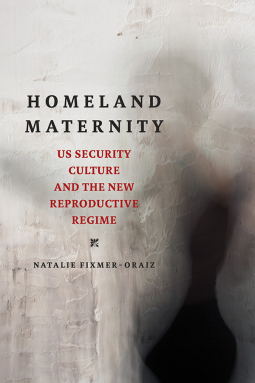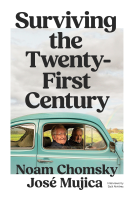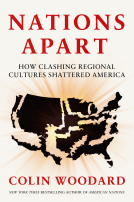
Homeland Maternity
US Security Culture and the New Reproductive Regime
by Natalie Fixmer-Oraiz
This title was previously available on NetGalley and is now archived.
Send NetGalley books directly to your Kindle or Kindle app
1
To read on a Kindle or Kindle app, please add kindle@netgalley.com as an approved email address to receive files in your Amazon account. Click here for step-by-step instructions.
2
Also find your Kindle email address within your Amazon account, and enter it here.
Pub Date Mar 02 2019 | Archive Date Mar 28 2019
Talking about this book? Use #HomelandMaternity #NetGalley. More hashtag tips!
Description
In US security culture, motherhood is a site of intense contestation--both a powerful form of cultural currency and a target of unprecedented assault. Linked by an atmosphere of crisis and perceived vulnerability, motherhood and nation have become intimately entwined, dangerously positioning national security as reliant on the control of women's bodies.
Drawing on feminist scholarship and critical studies of security culture, Natalie Fixmer-Oraiz explores homeland maternity by calling our attention to the ways that authorities see both non-reproductive and "overly" reproductive women's bodies as threats to social norms--and thus to security. Homeland maternity culture intensifies motherhood's requirements and works to discipline those who refuse to adhere. Analyzing the opt-out revolution, public debates over emergency contraception, and other controversies, Fixmer-Oraiz compellingly demonstrates how policing maternal bodies serves the political function of securing the nation in a time of supposed danger--with profound and troubling implications for women's lives and agency.
Natalie Fixmer-Oraiz is an assistant professor of communication at the University of Iowa.
Advance Praise
"I love Homeland Maternity. It's brilliantly conceived, broadly interpretive and intersectional, wisely written, politically astute, and very useful. I wanted to underline nearly every sentence. Fixmer-Oraiz has crafted an extremely smart and scary book."--Rickie Solinger, coauthor of Reproductive Justice: An Introduction
"In this clearly written and cogently argued book that ranges across a broad array of public discourse, Natalie Fixmer-Oraiz brings into focus the disturbing intersections between reproductive politics and national security in the post-9/11 era. Historically and theoretically informed, Homeland Maternity makes clear that the regulation of women’s bodies is a key weapon in struggles over nationalism, nativism, and the meaning of security."--Bonnie J. Dow, author of Watching Women's Liberation, 1970: Feminism's Pivotal Year on the Network News
"A must-read for scholars interested in contemporary motherhood and/or the rhetoric of security. In Homeland Maternity, Fixmer-Oraiz offers an incisive analysis of an eclectic set of texts to illuminate how the long-standing connections between discursive constructions of motherhood and the nation function in the post-9/11 United States."--Sara E. Hayden, coeditor of Mediated Moms: Contemporary Challenges to the Motherhood Myth
Available Editions
| EDITION | Other Format |
| ISBN | 9780252084140 |
| PRICE | $24.95 (USD) |
| PAGES | 280 |
Links
Average rating from 3 members
Featured Reviews
 David W, Media/Journalist
David W, Media/Journalist
After the terrorist attacks of 9/11/2001, it became almost treason not to increase the number of white babies in the USA. Abortion became anathema, and the state began stepping in between doctors and pregnant and even pre-pregnant women. In other words, biopolitics is all about white supremacy, says Natalie Fixmer-Oraiz. She is very clear on this in her straight-shooting new book, Homeland Maternity.
Women are not only not allowed control of their bodies, but government will ensure their unborn are treated the way it wants, and not the way the mother intends. As government turns off aid and assistance, it has turned up enforcement, putting pregnant women in daily jeopardy. There are publicity campaigns encouraging women to become mothers, and lies about droves of women abandoning their careers to become mothers. The nation is, apparently, at risk, and every woman has a patriotic duty to provide new (white preferred) recruits.
“The concept of fetal personhood regularly eclipses claims to reproductive or maternal rights, in which pregnancy itself is regularly medicalized and managed by experts, a culture in which risk in any form – but particularly that related to the future of the nation and its citizenry – is to be avoided at all costs,” she says. It is no longer acceptable to carry a pregnancy to term without medical supervision and meds. And at any time, a doctor, nurse or receptionist can turn a patient in for government oversight, if not incarceration, if they don’t like an expectant mother’s behavior or even history.
Women are considered a threat to their pregnancies unless they succeed. The list of legal penalties is disgusting. Women are held criminally liable for negative pregnancy outcomes. A woman in a coma was kept alive to preserve a fetus that had zero chance of survival, despite the woman’s advance directive and her family’s wishes. Another was charged with murdering her fetus after she fainted and fell down stairs. An Indiana woman was convicted of both child neglect and feticide after suffering a miscarriage. And ironically, such women are refused prenatal care while in custody. Their private medical data is made public, they are prosecuted for failing to come to term. One was even charged with murder when her attempted suicide failed.
She opens with what I hope is the most odious story of all, the Loertscher case, which is still active in the courts system. Tamara Loertscher was charged with contravening Wisconsin’s Unborn Child Protection Act. She was incarcerated, forced to undergo continual drug tests (at her own expense) as part of parole, classified as a child abuser and denied legal representation (though the state appointed one for her fetus). Her crime was to admit to her own doctor she had taken methamphetamines and marijuana in lieu of prescription drugs she could not afford for her hypothyroidism and depression – before her pregnancy. In jail, she was denied prenatal care, threatened with a Taser and put in solitary.
American women are under surveillance at all times. Anyone can call the authorities if they suspect a woman has had a miscarriage or an abortion. The whole misanthropic legal system comes down on her. Then, the final knife twist of hypocrisy comes when the child is born, and there is no medical help or followup. Healthcare for the born is only for those rich enough. But America can’t do enough for a fetus.
The book covers several broad areas, like egg-freezing and infertility clinics, legal madness, emergency contraception (morning-after pills), pregnancy centers and the influence of cultural media, where Fixmer-Oraiz spends way too much time examining films and reality TV depicting the angst of teen pregnancy.
It moves swiftly, despite Fixmer-Oraiz’ use of long, scientific and academic words, a tribute to her style. On the other hand, she has some pet words that crop up far too many times, and become distracting and annoying. Words like synecdoche and undergird appear at least 20 times each, more than I’ve ever seen them in total in my life. And there is the ever-pompous Thus, which also appears a good 20 times. A little editing would make them less obvious and so less distracting, because the message itself is hugely important.
It’s not just no control over their own bodies. Women are being made ever more powerless while also being held totally responsible. Here, in 21st century America.
David Wineberg
I took a Women's Studies class in college which focused on the various patriarchal pillars of military regimes. Going into the class I assumed we would focus on "other" countries, but as the class progressed my eyes were opened to the layers of control the United States military holds over our nation's citizens and those we "protect".
As the saying goes "hindsight is 20/20" and it is easy to pinpoint previous times in American history where reproduction was forced or heavily encouraged as a form of patriotism, such as enslaved colonial African-American women or white, suburban "Baby Boomer" women. It is also easy to see times when reproduction was disapproved of and thwarted, most notably during forced sterilizations of Black, Native American, and institutionalized women in the 1930s, 1940s, and 1950s. Now we see a daily news cycle highlighting the various new ways the government wants to control every aspect of reproduction.
While this definitely is an example- and proof-heavy text, Fixmer-Oraiz has organized the various aspects of how national security is entwined with reproduction into an understandable (yet jarring) piece of work.
Readers who liked this book also liked:
Publishers Lunch
General Fiction (Adult), Nonfiction (Adult), Teens & YA
Noam Chomsky; José Mujica; Saúl Alvídrez
Essays & Collections, Multicultural Interest, Politics & Current Affairs









